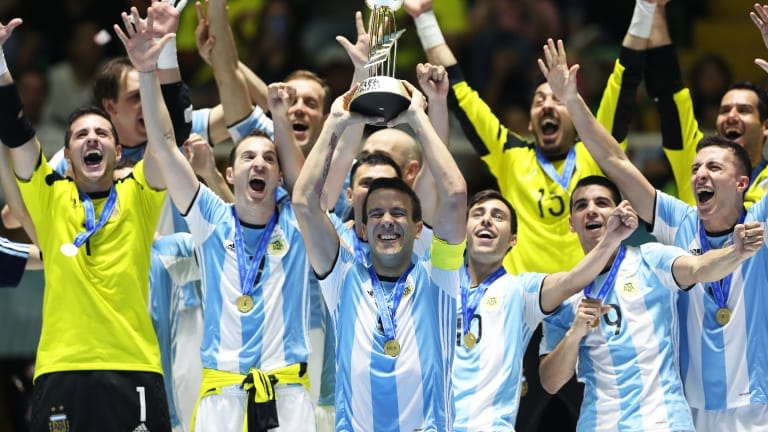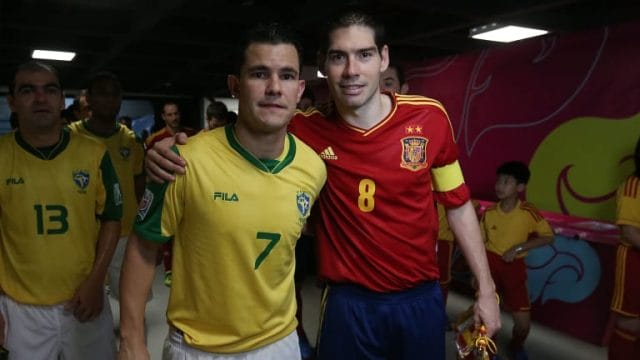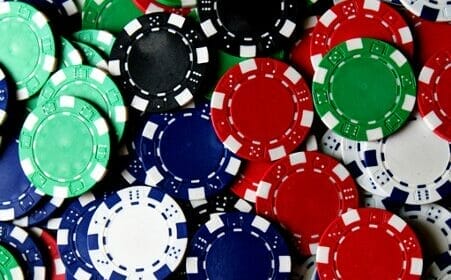Kike: Playing in four Futsal World Cups was a huge privilege
- Spaniard Kike Boned turns 43 today
- Historic figure won World Cup in 2000 and 2004
- Shares memories and discusses upcoming World Cup with FIFA.com
There are few more respected voices in the world of futsal than that of Kike Boned, a two-time world champion – in 2000 and 2004 – and runner-up at the next two editions. And though he has been retired some seven years now, it is still strange not seeing him in the famous red of Spain.
To mark his 43rd birthday, FIFA.com spoke to him about his past glories, the current state of futsal and what he expects from the FIFA Futsal World Cup Lithuania 2021.
FIFA.com: As you turn 43, what springs to mind when you look back on your hugely successful career?
A sense of pride and privilege at having enjoyed a wonderful sport that allowed me to enjoy unforgettable moments for club and country – moments that went beyond mere victories and defeats. When you retire you realise how lucky you are and that nothing compares to everything you experienced as a player.
What, if anything, would you change from your 20 years in the game?
We all ponder that question but, on reflection, I always say that I have no right to complain about anything I’ve experienced. I had a very full, satisfying and rewarding sporting life in every sense. I’m sure I could have done some things better or taken other decisions, but it’d be very unfair to change anything because what I experienced was truly unforgettable.
If you had to single out just one moment from your career?
That’s hard… As you get older, you downplay the sporting side of things and assign greater value to the rest, to the important things. When I’m asked to pick my worst moment, everyone assumes it’s losing on penalties in the final of a World Cup [at Brazil 2008] or EURO, but no, it was when the team had a bus accident in 2005 and I wasn’t traveling with them. You get up in the morning to see 200 missed calls and have no idea what’s going on… These days, things like that matter more than sporting ones.
I was chatting with [former Brazil international] Vinicius the other day and we agreed that what we really valued was the experience, regardless of the outcome. We were looking at a photo of us taken before the final of the 2012 World Cup in Thailand, which he was lucky enough to win and we weren’t. Just to be able to have that moment, to be in that place, to be selected for the final and to enjoy it… So singling out one specific moment is very difficult and a bit unfair after a 20-year career.
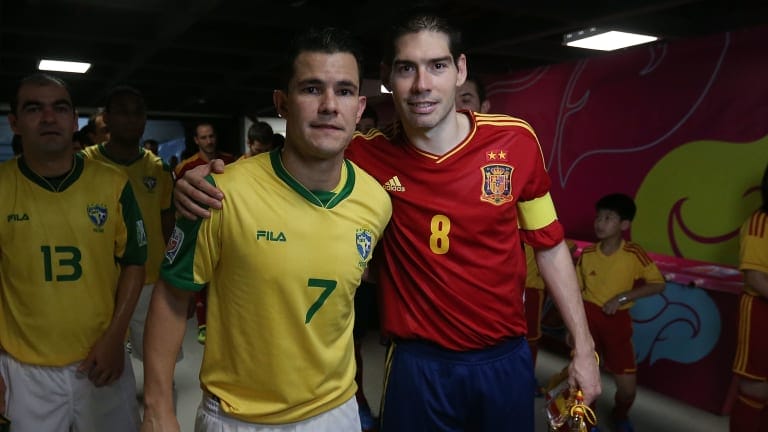
But there was a special moment at that 2000 World Cup, when Spain secured their first title and showed, above all, that Brazil could be beaten…
That was the turning point for futsal in Spain, and it would mark the careers and lives of all of us who were there. It changed the history of futsal in Spain and the world. We showed that Brazil were not invincible, that there was a group of ‘crazies’ who decided they could be beaten – and in the final of a World Cup no less.
At the time it was an incredible thing, and we continue to celebrate it after more than 20 years. So we’re a privileged group. It was one of the most important matches, if not the most, of my career, for everything it meant, and yet I did not actually play in it. I was a kid still, the youngest in the team, but I feel privileged to have been able to experience that in front of those thousands of people.
And those ‘crazies’ then repeated the feat in 2004…
A lot of things were different that year, it was different futsal by then. What is true is that we took advantage of Brazil’s continued belief that their defeat in 2000 had been a fluke. In 2004, we took the concept of playing as a team to the extreme. In terms of capability and individual quality, we knew we were far behind Brazil, but we gave a masterclass on what it is to compete and be a real team.
It’s also true that nothing compares to the first time. Although we enjoyed 2004 a lot and retaining the title was historic, for the five of us that played at both World Cups, the sensations second time around were different, despite being well aware of its importance.
Would you say that there is now more parity in the game, with the team taking precedence over individual brilliance?
There are more [coaching] tools now and greater emphasis on playing as a team, while sides have improved in terms of physical and tactical preparation. It’s a lot harder now to get an advantage and, while differences remain and the good teams are still very good, everything has become more evenly matched. If you watch a World Cup or EURO fixture, it’s hard to say who the clear favourites are, when previously it was always evident.
Has this levelling-out also affected Spain, who have found it increasingly difficult to win at European level?
To a certain extent. It’s undeniable that if your opponents are weaker, you have a better chance of winning, but the degree to which your competitors have improved essentially depends on who you’re up against. In recent years Spain have been one of the teams setting the pace, but they lost the 2018 EURO to Portugal and were eliminated by Russia in the quarter-finals of the 2016 World Cup. That forces you to keep improving and to never just settle for what you have. What’s certain is that your own improvement stems from the progress being made by your rivals.
Brazil made us a better side and demanded the utmost from us as a team, as did everyone else we faced. I also believe that Brazil were forced to keep improving because of the questions we asked of them. Their defeats were in part due to their inability to understand who they were up against in that era.
At the 2000 World Cup, we showed that Brazil were not invincible, that there was a group of ‘crazies’ who decided they could be beaten – and in the final of a World Cup no less.
What do you learn by playing at a World Cup?
You learn to value things. I was fortunate enough to play at four of them, which was an enormous privilege. In the day-to-day life of a World Cup, you understand how valuable the group is and the really important role empathy plays within it. You learn to put the good of the team above the personal and that the smallest detail can make the difference.
How will you follow Lithuania 2021?
I’ll enjoy it but differently, hoping Spain can get a third star, which would be good for everyone here. Winning would give a boost to the sport nationally, as happened to us in 2000 and Argentina after the last World Cup. I’ll be watching it from home, suffering with the team but trying to enjoy the play. I suffer much more as a fan than as a player, which has surprised me.
What are your expectations for Spain?
Spain are always in with a chance. They have a generation of young players who will have a big role in the team’s future. There’s more and more parity and the range of title contenders is greater, but Spain are among those candidates. The competitive level of the top Spanish futsal league remains high, so that should give Spain a head start over others at the World Cup.
As a veteran of four editions, how does being the host nation, as Lithuania will be this year, change a country?
In the four editions I had the good fortune to take part in, you realise that the battle for the World Cup itself has nothing to do with one country or another. What we experienced in Guatemala in 2000 was a genuine craze, a frenzy. The tournament in China’s was different, as it was when Brazil hosted it, which goes without saying… Now the Futsal World Cup is coming to Lithuania, a small country but one with a tradition of indoor sports, so hopefully it can make its mark and that circumstances allow that impact to be considerable. The country and its federation have got behind it and I believe it’ll be a success.
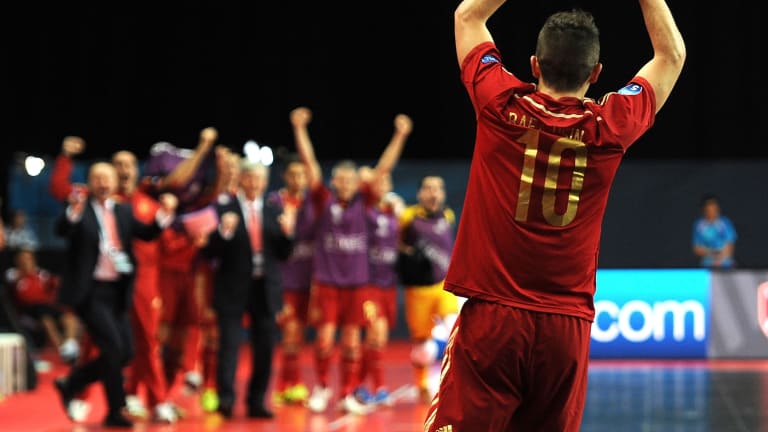
Players and teams to watch in Lithuania
Kike did not hesitate to single out some names and national teams to follow at the upcoming FIFA Futsal World Cup.
Pito: “I’d pay the entrance price for a Brazil game just to see him. There’s also Ferrao, Gadella and a lot of other players, but Pito has everything a futsal player needs. He’s true to his sport and his team, conscientious in his behaviour, has a technique and range of ability that is beyond reproach, and he entertains the fans. And he does it all with a smile. If I were Lithuanian and going to watch a World Cup game at one of the arenas, then Pito would definitely be someone worth watching.”
Fernan: “He’s in the same bracket as Pito. I’m sure he’s going to be in the Spanish team. He’s a 26-year-old who is in tremendous form at present and is ruthless. I’m convinced he’ll be worth watching at the World Cup.”
Argentina: “They’ll continue to place great store on collective strength. Their rivals mustn’t make the mistake of dismissing their 2016 title as a fluke. The immense work started by Diego Giustozzi and continued by Matias Lucuix will be evident in Lithuania.”
Russia: “There is a crop of young Russian players at an extraordinary level and, if the team is able to harness that strength, they will have a great chance. They’re one of the many teams that are progressing, while being very competitive and capable of putting up a real fight.”
